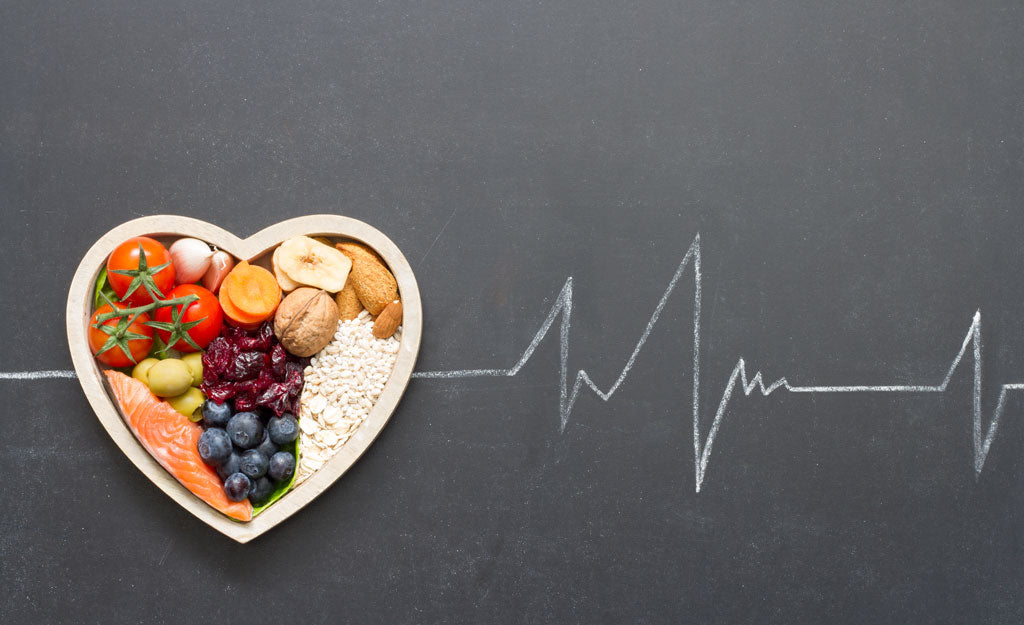When we do not exercise enough and consume large amounts of fatty foods it can cause our cholesterol levels to be high. When we have high cholesterol we can feel a range of symptoms, such as chest pain, nausea, extreme fatigue, and shortness of breath. These symptoms can sometimes be worrying. It is important to know your cholesterol level and to see your local doctor when you experience these symptoms.
In this article we share with you the easy yet effective ways you can lower cholesterol levels. With lower cholesterol levels, it is easier to feel healthy, energised, and happy.
There are many actions you can take to maintain healthy cholesterol levels, from diet to lifestyle, and we share with you how you can do it. But first, what actually is cholesterol?
What is Cholesterol?
Cholesterol is an essential part of every cell membrane in the human body. It is needed in the digestive system to break down fats, lipids, and oil from foods. It can be introduced into the body through food or manufactured in the body by the liver. However, it isn't actually necessary to consume it in the diet as enough is produced by the body.
The amount of cholesterol in the body can be determined by a blood test. To see your cholesterol levels visit your local health practitioner who will let you know if it is within a healthy range. If your cholesterol levels are too high it can increase the risk of developing heart disease.
Deciding if your cholesterol level is a health issue that needs treatment depends on two factors. One is your total cholesterol level and the other is if you have additional risk factors. These can include: smoking, diabetes, high blood pressure, low HDL cholesterol, and a family history of premature heart disease.
Reducing cholesterol in the body isn’t something we can do quickly or straight away. It takes time (at least 6 months) and means making healthy lifestyle, diet, and exercise changes. But you can do it. It is possible. By taking things step by step, change by change, you can maintain healthy cholesterol levels and feel like your best self. Here are our top tips for lowering cholesterol and maintaining optimal health.

How To Lower Cholesterol? (Diet Tips)
The kinds of food that we eat can have a significant impact on our cholesterol levels. Here are some foods that can help us to reduce our cholesterol and how we can bring them into our everyday life.
Foods to Consume
Fibre
Certain forms of fibre such as oat bran, slippery elm powder, flaxseed and psyllium seeds encourage cholesterol excretion. Sprinkle over your cereal or add to your smoothie for some added fibre intake.
Psyllium
Another form of fibre, psyllium inhibits the absorption of dietary cholesterol and lowers overall cholesterol levels by up to 15%. It can also lower blood pressure and strengthen heart muscle. Add to your juice for an easy way to bring it into your day.
Vegetarian Diet
Eating a mainly vegetarian diet that includes plenty of grains, fruits, vegetables, legumes, nuts and seeds is a great way to reduce cholesterol levels. These foods are void of cholesterol.
Apple
Apple pectin has an affinity for cholesterol – it binds to and facilitates its excretion from the body. Grate an apple onto your porridge in the morning.
Garlic, Ginger, Onion
When cooking be sure to flavour with garlic, ginger, and onion as much as possible. They help to reduce blood cholesterol and triglycerides.
Lemon & Water
Squeezing half a lemon into some warm water first thing in the morning is another way to lower cholesterol. It stimulates liver and gallbladder function, cleanses the bowel, and primes digestion for the day.
Omega-3 Fatty Acids
Omega-3 fatty acids in the form of deep-sea oily fish is another great way to lower cholesterol. Salmon, snapper, mackerel, anchovies, cod, sardines, and halibut are all healthy alternatives to red meat.
Lecithin
Lecithin helps to break down cholesterol during digestion. It can also help anxiety, certain types of depression, and eczema. Sprinkle onto your cereal or in your smoothie to emulsify fats, lipids, and oils.
Herbal Tea
Herbal teas promote liver detoxification and cholesterol elimination. They also have a number of other health benefits, such as improving digestion and relieving pain. For reducing cholesterol, dandelion root, chicory, and burdock are the best choices.
Scientific and medical evidence in support of vitamins is increasing. Much of this information is covered in the book Highway to Heart Health: Antioxidants and You written by Ross Walker. His program is based on fresh foods rich in antioxidants and similar to those found in the traditional Mediterranean diet. He also recommends extra virgin olive oil, green tea, fruits and vegetables, red wine and extra doses of vitamin C, vitamin E and a B-complex.
What Foods Lower Cholesterol? (Foods to Avoid)
While these are great foods to add to your diet, there are also many foods that increase cholesterol levels. If you are looking to lower levels, then here are the foods to avoid.
Saturated Fats & Trans Fatty Acids
95% of the average daily consumption of trans fat is in the form of partially hydrogenated vegetable oil products. Some examples include 'easy-spread butter', margarine (which contains 20% trans fat) and vegetable shortenings. Trans fatty acids are 'hidden' in many processed foods that use partially-hydrogenated vegetable oils (e.g. doughnuts and biscuits). Most commercial dietary oils have been subjected to partial hydrogenation and therefore contain large amounts of trans fatty acids.
Avoid Fried
Avoiding fried and fatty foods is important when looking to lower cholesterol. French fries, deep-dish pizzas, and doughnuts are all examples of food that not only increase cholesterol, but are high in fat, salt, and low in fibre.
Refined Carbohydrates
Refined carbs include processed grains that do not have fibre, nutrients, or bran. Instead, they are high in sugar. Examples include white flour, white bread, white rice, pasta, and breakfast cereals.
Decrease Omega-6 Fatty Acids
They’re usually found in corn oil, safflower oil, vegetable shortenings, margarine, processed foods, and tinned foods. Instead, opt for virgin olive oil, a healthier alternative.
Healthy Lifestyle Changes For Reducing Cholesterol
Though changing the kinds of food we eat is an important factor in reducing cholesterol, it is also important to make sure that we make healthy lifestyle changes too. Here are some changes we can make to work towards maintaining a healthy cholesterol level:
Stop Smoking
Smokers have a higher risk of high cholesterol levels.
Exercise Regularly
An average of 40 minutes of moderate to vigorous aerobic activity is recommended three to four times weekly.

Achieve Your Ideal Body Weight
You’ll not only look and feel better; you also reduce your risk of heart disease and other serious health problems.
Reduce Alcohol Intake
Drinking alcohol raises the triglycerides and cholesterol in your blood. If these levels become too high they can build up in the liver and make it harder for the liver to remove cholesterol from your blood. There are many great, healthier, and fun alternatives to alcohol.
Manage Stress
Stress can make quite a significant impact on cholesterol. Try yoga as part of your daily exercise or end the day with some meditation. Mindfulness, going for walks, and eating healthy are other ways to reduce stress.
Improve Liver Function
The liver is responsible for reducing cholesterol and stopping it from being recirculated in the body.
Natural Remedies For High Cholesterol
Antioxidants
Vitamin C, Vitamin E, CoQ10 and a B Complex formulation offer protection from the damage caused by free radical activity on the artery walls. Free radicals can damage blood vessel walls long before blockages develop in the coronary arteries. Try taking these vitamins as a daily supplement or eat foods fortified with them.
Plant Sterols
Often found in legumes, vegetables, nuts, and seeds, plant sterols may help to lower cholesterol levels. They work by lowering cholesterol absorption and reabsorption. Take a daily dose of 2-3 grams of plant sterols per day as recommended by the National Heart Foundation of Australia. Choose a formula that also supplies a healthy dose of beta carotene, which may become depleted when taking plant sterols.
Coenzyme Q10
Coenzyme Q10 helps maintain heart and artery health. Take it as a daily supplement in the morning with breakfast. This supplement cannot be taken alongside some medications so check to see if you can have it.
Herbs
There are many herbs that strengthen and maintain good liver health, which is vital for lowering cholesterol. Herbs such as Globe Artichoke, Golden Seal, Dandelion and Milk Thistle support and protect liver function and are indicated for the treatment of cholesterol. Bitter herbal preparations such as Dandelion Root tea are also traditionally used to support liver function.
These ingredients can be found in our natural daily supplement, Happy Liver. It works to maintain optimal liver health, and supports the liver to detoxify the body effectively.
If you follow as many of these tips and suggestions as possible, then you can reduce your cholesterol levels and the risks associated with elevated cholesterol levels. Lowering our cholesterol doesn’t need to be stressful. When we take it one step at a time, one recommendation at a time, we can gradually get to healthy cholesterol levels again.











Leave a comment
This site is protected by hCaptcha and the hCaptcha Privacy Policy and Terms of Service apply.